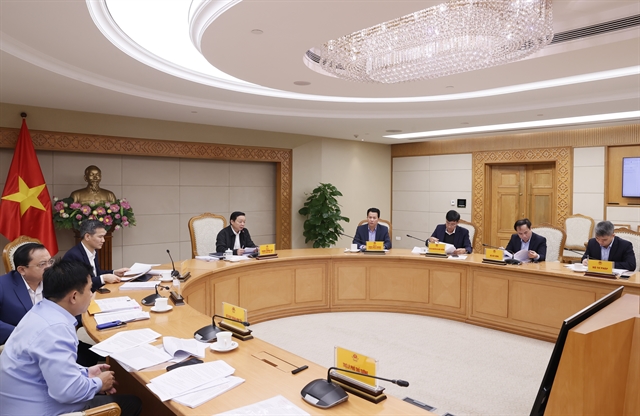 Society
Society

 |
| Lê Đình Thăng, chief finance auditor of the State Audit of Vietnam. Photo baodautu.vn |
Lê Đình Thăng, chief finance auditor of the State Audit of Vietnam, speaks to Đầu Tư (Investment) newspaper about effective management, exploitation and utilisation of natural resources and minerals.
Could you elaborate on the reason why the mining sector's annual GDP contribution has declined and why its growth rate has been below target for a number of years?
Geological and mineral resources are both important for socio-economic development and long-term national reserves. The Politburo issued Resolution 02-NQ/TW (dated April 25, 2011) on the strategic orientation of the minerals and mining industry towards 2020 and a vision to 2030.
It requires State management of natural resources and minerals to be planned, investigated and focused.
For socioeconomic development, natural resources and minerals must be used responsibly, economically and efficiently.
The mining sector's current contribution trend to the GDP is downward. Its share of the GDP decreased over time, from 9.73 per cent in 2005 to 7.79 per cent in 2011 and just 4.25 per cent in 2015.
The contribution declined from 2.93 per cent in 2022 to only 2.48 per cent in 2023. The mining industry's contribution to GDP decreased in the first quarter of this year, with a negative growth of 5.84 per cent when compared to the same period in 2023.
That's encouraging since it indicates that the economy has progressively become less reliant on natural resources. The services and construction also contributed to the diminishing contribution.
Do you find the negative growth in the mining industry to be regrettable?
I agree with this. Việt Nam, a nation endowed with abundant and diverse natural resources, has seen a negative rise in the mining industry. This explains why the GDP growth in 2011–15 and 2016–20 did not reach the expected level.
Due to a shortage of raw materials, the mining industry's negative growth has a significant impact on a number of other businesses, most notably construction, public investment in socioeconomic infrastructure and civil construction.
Due to the high cost of building materials, public investment has not kept pace with demand and the cost of flats and social housing has remained high.
I believe that in order to support economic growth during this time and in the years to come, attention must be directed into strengthening the mining industry.
Recognising the special role of natural resources in the national development, which resolution has been issued by the Party?
Resolution 10-NQ/TW on strategic orientations for geology, minerals, and the mining sector to 2030, with a vision to 2045, was released by the Politburo on February 10, 2022.
The resolution makes it very clear that the management of planning, exploration, exploitation, processing and use of minerals must have a strategic vision, meeting the requirements of socio-economic development in the immediate, medium and long terms.
In order to explore and utilise minerals as common building materials in line with reality, regulations pertaining to the auctioning of mineral mining rights must be reviewed, amended, supplemented and completed.
We must strictly inspect and control mineral exploitation activities, ensure fairness, publicity, transparency, combat negativity and waste of resources and increase revenue for the budget.
Priority should also be given to obtaining licences for the common use of minerals as building materials while building infrastructure.
To develop the mining industry, it is necessary to adjust the natural resources tax rate for some minerals to encourage investment in advanced and modern technology to exploit and process mineral mines with challenging geological conditions, low content, and inadequate technical infrastructure
Furthermore, regulations must be strengthened to incentivise companies to collaborate with overseas enterprises and employ cutting-edge, contemporary technology for mineral processing.
It is well known that the State Audit has frequently carried out specialised audits in the fields of minerals and natural resources. Could you share the outcome?
Since 2013, audits have consistently regarded mineral management and exploitation as a primary concern.
The State Audit has carried out three theme audits. We carried out a theme audit on the State management of mineral extraction activities in 2022 at Vietnam Cement Corporation, Vietnam Coal and Mineral Industry Group, the Ministry of Natural Resources and Environment, and 25 localities.
It demonstrated the numerous constraints still present in the contemporary management and use of natural resources and minerals. Minerals and natural resources are in danger of running out due to resource use, which is nevertheless wasteful.
Many areas use natural resources and minerals for economic growth; as a result, they mine minerals carelessly and indiscriminately, harming the environment and upsetting ecological equilibrium. This is notably the case for firms that mine coal, metal ore and building materials.
We have presented a proposal to the National Assembly, Government, ministries and local authorities, maintaining that advancing the mining sector aims at economic expansion. However, as mineral resources are limited, they should only be used when the necessary technology is available.
After being exploited, they must be processed, refined, and used as locally as possible to prevent waste, and reduce the amount of crude exported. VNS




